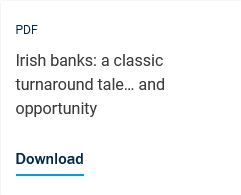
Columbia Threadneedle: Irish banks – a classic turnaround tale... and opportunity
The sector has gone from being one of the riskiest in Europe to among the safest – an excellent example of the situations we look for, and that our deep research and bottom-up approach allows us to benefit from.
13.05.2024 | 06:39 Uhr
At a Glance
- Over the past 15 years the sector has metamorphosed from being one
of the riskiest in Europe to among the safest - Columbia Threadneedle Investments was invested in the bonds of Irish banks throughout this period, seeing a credible balance sheet improvement journey not yet reflected in credit spreads
- This is an excellent
example of the types of situations we look for, and that our deep
research and bottom-up approach allows us to seek out
and benefit from
„All that falls, rises; all that is lost, finds its way back; all that is forgotten, is remembered again“
James Joyce, Finnegans Wake, 1939
In April, with little fanfare, AIB (Allied Irish Bank) became the first Irish bank to issue a 10-year dollar senior benchmark bond1.It was popular with investors: the bank borrowed $1 billion with orders of $7 billion. It was priced at 160bps over Treasuries – a similar level at which we would expect the larger UK and French banks to issue. This confirms that Irish banks are back to their rightful place in the eyes of credit investors.
This hasn’t always been the case: in late September 2008, Irish banks were shut out of the credit market. In an attempt to restore confidence the then finance minister, Brian Lenihan, announced a blanket guarantee of the banking sector’s deposits and debt. Two years later, the only lender left was the European Central Bank (ECB). The ECB’s then president, Jean-Claude Trichet, wrote to Lenihan saying that further emergency lending to Ireland’s banks could only be extended if the Irish government submitted a request for financial support to the Eurogroup, a group of finance ministers from the eurozone countries. An €85 billion support package followed days later, with €50 billion committed to the banking sector2. The Irish sovereign posted an annual budget deficit of 32% of GDP3, and AIB offered subordinated bondholders 25 cents on the euro for their bonds4.
From that point, Ireland embarked upon a remarkable period of deleveraging. Since the nadir in 2009, household and sovereign debt have fallen by around 90 percentage points of GDP to 26% and 39% respectively. The country now has the lowest levels of leverage in Europe – and there is ample room for growth. Simultaneously, the banking sector went through a metamorphosis from being one of the riskiest in Europe to among the safest.
At Columbia Threadneedle Investments, throughout much of this period of improvement we have invested in the bonds of Irish banks. We now think the fundamental improvement story has played out and is fully reflected in credit spreads. Let’s look at why:
Business model
We like simple business models. Banks are leveraged entities – the more complex the product, the more scope for mistakes. Irish banks are simple retail banks, which make money by lending to the local economy, principally through loans secured on residential property, with low loan to value (around 50% in Ireland). It is difficult to make a mess of this situation: in simple terms, if borrowers are employed, they will meet the mortgage payments, and even in periods of financial stress those payments are typically prioritised over discretionary spending.
Liquidity
The Irish banking sector is now awash with liquidity. Back in the dark days of the noughties, the system-level loans-to-deposits ratio peaked at more than 200% (in excess of 100% is generally considered weak and lower numbers are better). It is now the lowest in Europe at around 70%5; the European average is around 90%. What’s more, Irish banks boast liquidity coverage ratios (liquid assets held against short-term liabilities) and net stable funding ratios (a measure of the funding supporting loans made by the bank) that are among the best in the sector.
Earnings
International competitors such as NatWest and KBC have retreated from Ireland. That leaves a duopoly in commercial banking (Bank of Ireland and AIB) and an oligopoly in mortgage banking (PTSB is the third player). This has resulted in reduced competition on loans and deposits. Deposit beta (the percentage of an ECB rate hike which gets passed through to depositors) is less than half the European average at around 10%6.All of this is great for profitability: net interest income at the three Irish banks increased by a staggering 85% from the end of 2021 to end 2023. The European average was around 30%7.
Asset quality
We will never forget Anglo Irish, the bank with around two-thirds of its loan book in non-performing loans. It didn’t survive. With the help of the National Asset Management Agency (NAMA), the state sponsored bad bank, the other Irish banks steadily worked through the asset quality problem over a decade. Non-performing loans are now down by more than 90% to acceptable levels8.While the banks still make commercial real estate loans, concentrations are now much more in line with the broader European sector. We expect bad debt charges for coming years to be in line with larger UK and French peers.
Capital
Like us, the regulators have not forgotten the events of the past. Capital ratios are optically good relative to peers, but digging a bit deeper we think they look great. Banks are required to hold capital relative to risk-weighted assets. Irish risk weights are higher, so its banks hold around 50% more capital than the European average for a given loan type. Are Irish loans 50% riskier? We don’t think so. In fact we think this is regulatory conservatism – which is great for bondholders.
1 AIB, AIB Group raises €625m in new capital amid strong investor demand, 24 April 2024
2 The Irish Times, Ireland to receive €85 billion bailout at 5.8% interest rate, 28 November 2010
3 The Irish Times, Deficit confirmed at 32%, 4 December 2010
4 The Irish Times, AIB plans to impose 90% loss on its junior bonds, 12 May 2011
5 Aggregate figure, as of April 2024, for the three main domestic banks: AIB, Bank of Ireland and Permanent TSB Group
6 European Central Bank/Columbia Threadneedle analysis, April 2024
7 Columbia Threadneedle estimates based on company reports, 2021-2023
8 Columbia Threadneedle estimates based on company reports, 2010-2023





Diesen Beitrag teilen: